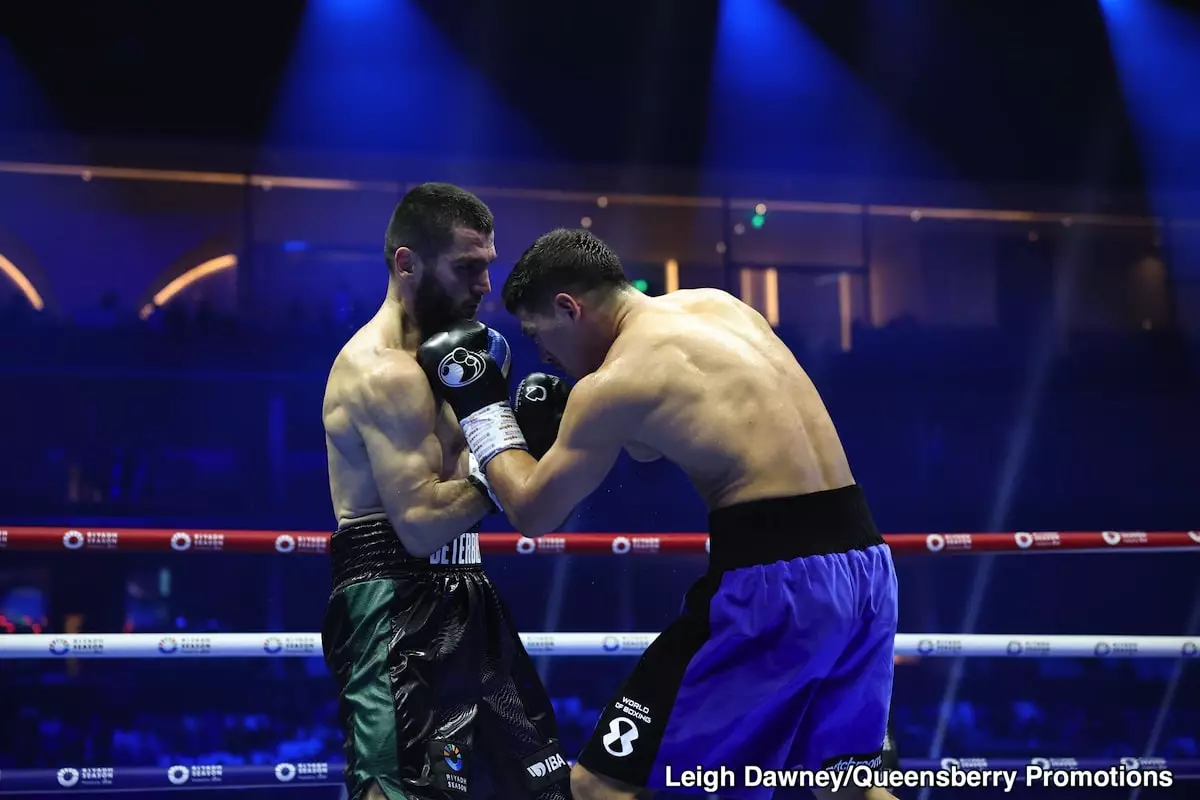When Artur Beterbiev squared off against Dmitry Bivol for the undisputed light heavyweight championship, boxing enthusiasts held their breath, anticipating an epic clash. In the aftermath of their match, Beterbiev commented on the fight’s dynamics, stating that he felt he had hurt his opponent but not sufficiently to secure a knockout. Their bout, which transpired last Saturday night, served as a blend of strategic challenges and moments of explosive showmanship.
Sluggish Start and Tactical Evolution
Beterbiev began the fight in a somewhat toilsome fashion, engaging in Bivol’s boxing strategy rather than imposing his own physical style right off the bat. The initial rounds were defined by a degree of cautiousness, as both fighters appeared to be settling into their rhythms. Bivol effectively leveraged his speed and footwork, outmaneuvering Beterbiev and establishing control of the bout early on.
However, the tides began to shift in the sixth round when Beterbiev made necessary adjustments. By pivoting to a more aggressive approach, he succeeded in bruising Bivol’s left eye and compelling him to retreat. This marked the onset of a notable transformation in Beterbiev’s performance, as he took command over the latter segments of the fight. It was instructive to observe how a fighter can recalibrate mid-fight, illustrating the importance of adaptability in boxing.
Beterbiev’s newfound aggression showcased his ability to absorb lessons and respond to a dual-axis of pressure and opportunity—a critical analysis point in dissecting boxing strategies.
As the seventh round commenced, Bivol seized a fleeting opportunity to shift momentum back in his favor. He unleashed a formidable flurry, launching nine consecutive punches that seemingly put Beterbiev on the defensive. This high-octane moment captured the essence of how quickly fortunes can change in the ring: the adrenaline rush of assault contrasted sharply with the tactical considerations underpinning the sport.
Yet, this surge energized Beterbiev, who retaliated fiercely and pushed Bivol against the ropes, showcasing devastating power. The repercussions of this round were palpable—Bivol visibly wilted under Beterbiev’s precision strikes, a clear signal that he was running low on steam. Analyzing this period reveals the dichotomy of offense in boxing, underscoring how energy management significantly impacts fight outcomes.
Post-seventh round, Bivol increasingly became a passive participant. The last five rounds witnessed him largely disengaged, raising questions about stamina and strategic execution. For viewers convinced of Bivol’s superiority, the metrics of power shots landed told a different story, highlighting a fighter’s ability to adapt in the face of adversity.
The judges’ decision ultimately favored Beterbiev, resulting in a unanimous decision with scorecards reading 116-112, 115-113, and 114-114. Such scores sparked debate, especially with Bivol’s team contemplating an official protest regarding the decision. However, as Beterbiev’s victory unfolded, any attempts at protest seemed futile—a distraction from the fight’s reality.
Bivol’s manager, Vadim Kornilov, expressed dissatisfaction, yet the outcome remained unaltered. Boxing, often a sport steeped in subjective interpretations, inevitably raises questions about the integrity of judging. Nonetheless, one cannot ignore that Bivol was outperformed in pivotal moments, reinforcing the argument that tactical decision-making ultimately dictates the outcome in competitive boxing.
Beterbiev, maintaining an unblemished record of 21-0 with 20 KOs, expressed readiness for a rematch against Bivol, indicating a willingness to settle the score definitively. If a rematch materializes in early 2025, it poses an intriguing scenario for both competitors. For Bivol, adjustments are paramount; he must adopt a proactive mindset, increasing his pressure while injecting more eye-catching offensive maneuvers into his strategy.
This monumental clash between Beterbiev and Bivol encapsulated the drama and complexities within boxing. It serves as a reminder that every fight is a tapestry of strategy, execution, and resilience, reflecting not only the fighters’ prowess but also the volatile nature of the sport itself. Both fighters have laid their cards on the table, and as the dust settles, the anticipation for a potential rematch looms larger than ever.

